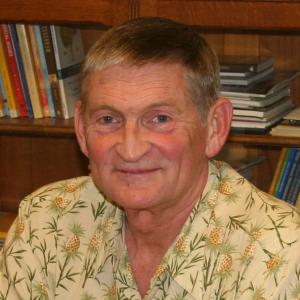Robert Thomas Knight

-
whatshotResearch Description
Robert T. Knight, M.D., is a Professor of Psychology and Neuroscience
Research Areas:
The laboratory studies the contribution of prefrontal cortex to human behavior. We use electrophysiological and behavioral techniques to study controls and neurological patients with frontal lobe damage in an effort to understand the neural mechanisms subserving cognitive processing in humans. The laboratory also records intracranial activity directly from the cortical surface (electrocorticogram; ECoG) and depth (stereoencephalography; sEEG) in neurosurgical patients with implanted electrodes to study the electrophysiology of network activity supporting goal-directed behavior in humans. The laboratory also uses this information for development of brain machine interfaces for motor and language prosthetic devices.
Current Projects
Human evolution is paralleled by a massive increase in the connectivity of the frontal cortex to other brain regions. The evolution of the prefrontal cortex is crucial for the development of human cognitive and social behavior. Damage to prefrontal cortex in humans from neurological or developmental disorders results in profound alterations in the ability to think, plan and interact in a socially appropriate manner. The laboratory is interested in the neural mechanisms by which frontal cortex controls distributed neuronal ensembles critical for both cognitive and social behavior. To achieve these aims the laboratory employs neuropsychological, neuroanatomical and electrophysiological techniques to study the physiology of prefrontal function in normal subjects and in neurological patients with frontal damage.
The laboratory also records intracranial activity (ECoG and sEEG) from neurosurgical patients undergoing pre-surgical evaluation for treatment of medically refractory epilepsy. This line of research aims to understand the network properties and neural coding supporting behavior in the human brain. The laboratory is also using intracranial signals for the development of brain-machine interfaces for motor and language prosthesis in neurological patients with disabling motor or language disorders.
Some broad areas under current investigation include: What is the timing and neural coding of interactions between prefrontal cortex and other brain regions engaged during attention, memory, decision making and language? What is the role of high frequency band activity (HFA; 70-200 Hz and distributed network coherence in human behavior? Can HFA from the human cortex be used to control robotic devices for paralyzed patients?
-
placeSelected Publications
(Full list and pdf files: https://knightlab.neuro.berkeley.edu/)
Knight, R.T. Decreased response to novel stimuli after prefrontal lesions in humans. Electroencephalography and Clinical Neurophysiology, 59: 9-20, 1984.
Knight, R.T. Contribution of human hippocampal region to novelty detection. Nature, 383:256-259, 1996.
Barcelo, F., Suwazono, S. and Knight, R.T. Prefrontal modulation of visual processing in humans. Nature Neuroscience, 3(4): 399-403, 2000.
Canolty, R., Edwards, E., Soltani, M., Dalal, S.S., Kirsch, H.E., Barbaro, N.M., Berger, M.S. and Knight, R.T. High gamma power is phase-locked to theta oscillations in human neocortex. Science, 313: 1626-1628, 2006.
Chang, E.F., Rieger, J.W., Johnson, K., Berger, M.S., Barbaro, N.M. and Knight, R.T. Categorical speech representation in the human superior temporal gyrus. Nature Neuroscience, 13(11):1428-1432, 2010.
Durschmid, S., Reichert, C, Dewar, C., Hinrichs, H., Heinze, H.J., Chang, E.C., Edwards, E., Dalal, S., Deouell, L. and Knight, R.T. Hierarchy of prediction errors for auditory events in human temporal and frontal cortex. Proceedings of the National Academy of Sciences, 113(24):6755-60, 2016.
Piai, V., Anderson, K.L., Lin, J.J., Parvizi, J., Dronkers, N.F. and Knight, R.T. Direct brain recordings reveal hippocampal rhythm underpinnings of language processing. Proceedings of the National Academy of Sciences, 113(40):11366-11371, 2016.
Johnson, E.L., Adams, J.N., Solbakk, A., Endestad, T, Larsson, P.G, Meling, T.R., Lin, J.J. and Knight, R.T. Dynamic frontotemporal systems process space and time in working memory. PLOS Biology, 16(3): 1-22, e2004275, 2018.
Helfrich, R.F., Lendner, J.D., Mander, B.A., Guillen, H., Paff, M., Mnatsakanyan, L. Vadeera, S., Walker, M.P., Lin, J.J. and Knight, R.T. Bidirectional Prefrontal-Hippocampal Dynamics Organize Information Transfer during Sleep in Humans. Nature Communications,10:3572, 1-16, 2019.
Lendner, J.D., Helfrich, R.F., Mander, M.A., Romunstad, L., Lin, J.J., Walker, M.P., Larsson, P.G. and Knight, R.T. An electrophysiological marker of arousal level in humans. eLife, doi: 10.7544/eLife.55092, 9:e55092, 2020.
Kam, J.W.K., Irving, Z.C., Mills, C., Gopnik, A. and Knight, R.T. Distinct electrophysiological signatures of task-unrelated and dynamic thoughts. Proceedings of the National Academy of Sciences, 118(4) e2011796118, 2021
Bellier, L, Llorens, A., Marciano, D., Gunduz, A., Schalk, G., Brunner, P. and Knight, R.T. Music can be reconstructed from human auditory cortex using nonlinear decoding models. PLOS Biology, doi.org/10.1371/journal.pbio.3002176, 1-12, 2023.
Hoy, C.M., Quiroga-Martinez, D.R., Sandoval, E., King-Stephens, D., Laxer, K.D., Weber, P., Lin, J.J. and Knight R.T. Asymmetric coding of reward prediction errors in human insula and dorsomedial prefrontal cortex. Nature Communications, doi.org/10.1038/s41467/023-4428-1, 2023.
-
filter_dramaTeaching